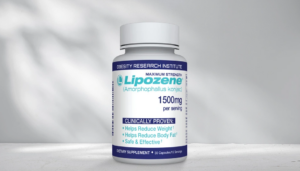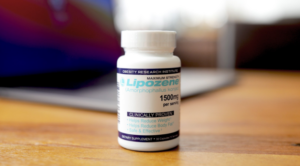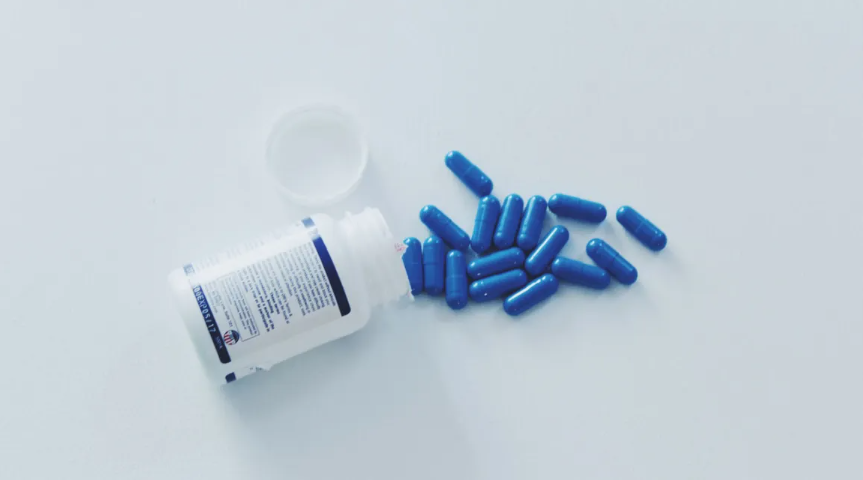Millions of people struggle with weight loss. Maybe you’re one of them. Companies have taken advantage of this common struggle, and now everywhere you turn, there seems to be a new weight loss product.
Unfortunately, for every legitimate product, there seem to be ten false ones.
It’s more important than ever to look into a product before you purchase.
Today we’ll examine Lipozene®, a popular product, and determine if it’s really worth your time and money.
How Can Lipozene® Help You Lose Weight?

Most weight loss supplements focus on calorie control as their main mechanism. These supplements suppress appetite so that the people who take them consume fewer calories throughout the day and create a deficit which, in turn, may aid them in losing weight.
The unfortunate reality is that many people consume more calories than necessary. Their bodies then store the excess calories as body fat.
This cycle leads many to become overweight and obese.
So how can you control cravings and eat fewer calories?
What if you simply didn’t feel hungry?
In order to suppress appetite, weight loss supplements use ingredients such as Konjac Root.
The Konjac root is a water-soluble fiber common in Japan. While the Konjac plant grows in China, Korea, and across Southeast Asia, Japanese cuisine has made it more widely known.
A Japanese ingredient called Shirataki is made from Konjac. Shirataki is sometimes called “yam noodles” and comes in both noodle and tofu forms.
When you eat Konjac root, the fibers are said to expand in your stomach, helping you feel full.
Its scientific name is Amorphophallus konjac, which is prominently featured on the Lipozene® website.
In the field of food science, Konjac root is viewed as a type of gum because of its thickening properties. It has several health benefits and may even be used in some foods.
What is Lipozene®?

So do Lipozene® and Konjac root work?
Glucomannan is the main active ingredient in Lipozene®. It’s a common ingredient in weight loss supplements, especially appetite suppressants.
Unfortunately, we don’t know how much glucomannan Lipozene® contains since the ingredients are listed ambiguously as a propriety blend.
The company that manufactures Lipozene is the Obesity Research Institute LLC (ORI).
The company claims that it manufactures Lipozene® in the US, but it does use both domestic and imported materials. Konjac root isn’t native to North America, so we can assume the main ingredient is imported from Asia, although we don’t know from which country.
How Should You Take Lipozene®?

The website recommends taking 1 to 2 capsules up to three times a day. You should take Lipozene® with at least 8 ounces of water, 30 minutes before a meal.
Taking the pill before a meal will give the fiber blend time to expand in your stomach. You should feel less hungry when mealtime rolls around and eat less.
There are supposedly no side effects for Lipozene®. Its shelf life is three years, and there is a clear expiration date listed on the bottle.
Product Warnings
The company does not recommend Lipozene® for pregnant or nursing women.
You should also be cautious when taking Lipozene® or any product containing glucomannan if you have diabetes or are taking other medications.
Since glucomannan absorbs water and liquids in the stomach, it may also absorb other substances. Your body may not absorb 100 percent of an oral medication if there is glucomannan present, making your medication less effective.
Those with type 2 diabetes should be aware that glucomannan can decrease blood sugar.
If you are already taking medication to lower your blood sugar, glucomannan could cause a severe drop in blood sugar. Consult your doctor first, as you may need to alter the dosage of your diabetes medication.
Results: What to Expect from Lipozene®

Lipozene® is supposed to help you lose weight through two methods:
1. By suppressing your appetite
2. By helping your body burn calories more efficiently
Based on the information provided, the product uses natural ingredients. There are no stimulants in Lipozene®, so you won’t feel jitters or experience the sensations of an energy crash once the product is out of your system.
The main ingredient in Lipozene® is glucomannan, and glucomannan can have some side effects.
Potential side effects and risks include:
-
Bloating
-
Gas
-
Abdominal pain
-
Diarrhea
-
Nausea
You should also watch out for any allergic reactions. In some users, negative reactions included:
-
Hives
-
Redness
-
Itchiness
-
Swelling of the mouth
-
Swelling in the throat
-
Wheezing
-
Difficulty breathing
The Science Behind Lipozene®

The Lipozene® website claims that it works by burning fat and suppressing appetite. The product website provides no other information about how Lipozene® works in the body.
Since there have been no scientific studies on Lipozene®, we’re limited to research conducted on the main ingredient. Many claims say that it is a powerful weight loss supplement.
Several users have reported that Lipozene® helps suppress their appetite and there is research on glucomannan that supports this benefit.
Glucomannan is a fiber that swells up in the stomach by absorbing water.
Researchers explain that consuming viscous, or thick, foods helps the body realize your stomach is full sooner. Your body can then send signals to your brain to stop eating.
Dietary fibers are a great source of viscous foods that can act as an appetite suppressant.
This property is why Konjac root can be found as an ingredient in some sauces. It works as a thickener.
Glucomannan is not only viscous but can also expand. In your body, it takes up more space in your stomach, helping you feel satiated.
One study found that glucomannan helped reduce body weight in overweight but otherwise healthy participants.
Compared to other commercial fiber supplements, glucomannan provided the best results. Researchers also tested guar gum and alginate, but they seemed to provide no additional weight loss.
Glucomannan does seem to reduce appetites and increase feelings of fullness, but there doesn’t appear to be any evidence that it can help the body burn fat.
Two of the three studies we reference later conclude that glucomannan doesn’t have a significant impact on weight loss.
These results indicate that taking glucomannan or Lipozene® alone isn’t enough to lose weight.
What People Are Saying About Lipozene®
Lipozene® has produced mixed reviews. Some users benefit and the main advantage observed was Lipozene’s®’s ability to suppress appetite.
Others found that the product reduced their appetites, but that it wasn’t enough to help them lose weight.
Some users had negative reactions or experienced gastrointestinal problems and found that the product was completely ineffective for them.
Review 1
“I’ve been taking them for a little over a week. I feel some difference, especially taking 2 pills before each meal. These pills keep you feeling full. I had chinese for dinner and usually I feel hungry maybe 30 minutes or so after eating Chinese, I still feel full, not as full, but certainly no where near as hungry as I would normally.”
-Walmart
Review 2
“I ordered this in hopes of losing about 25lbs. I took the pills like directed and didn’t lose a single pound. I worked out a few times a week and stopped eating fast food with these pills. These pills did make me feel full most of the day and i think helped shrink my stomach. Now when I’m not on the pills, I still don’t eat as much. I had really high hopes when ordering these pills because I saw a lot of good reviews and now I’m just disappointed.”
-Amazon
Review 3
“I got very nauseous to a point that I threw up after 15 min. taking this pill. After that, I was numb and nauseous, dizzy all day. I’m throwing this out.”
– WebMD
Published Studies
The claims of Lipozene® being “clinically proven” are problematic.
There is only one study mentioned on all the pages of their website, and the company doesn’t provide a link to the study.
Upon looking into the matter further, we found that the study was actually on glucomannan, not the Lipozene® product.
The details of the study present on the Lipozene® website appear to be correct otherwise.
The Effect of Glucomannan on Obese Patients

The study tested the effectiveness of glucomannan over a period of eight weeks. The study recruited 20 obese participants.
Researchers then divided them into two groups: a placebo group and a glucomannan treatment group. The group taking glucomannan received 1 gram (in two doses of 500 mg) of glucomannan with eight ounces of water.
The participants took the supplement before each meal, three times a day. They did not change their eating or exercise habits.
On average, the participants lost 5.5 pounds and experienced a decrease in cholesterol.
You can read the full study from 1984 in the International Journal of Obesity.
On the Lipozene® website, the summary of study results claims that the Obesity Research Institute sponsored this research on their product.
However, this study did not test the product itself, but glucomannan. There isn’t clear information available on whether ORI did sponsor this study.
Safety and Efficacy of Glucomannan for Weight Loss

A more recent study completed in 2013 looks at the safety and effectiveness of Glucomannan.
The participants in this study were between 18 to 65 years of age. Based on a BMI range of 25 to 35 kg/m, these 53 participants were classified as overweight or obese.
For eight weeks, participants took 1.33 grams of glucomannan three times a day before meals. The control group took a placebo capsule that looked identical but just contained water.
Researchers concluded that the supplement was safe, and saw no major problems in any of the participants.
They measured how effectively glucomannan could reduce weight through body composition, hunger/fullness, and glucose and lipid (sugar and fat) concentrations.
Surprisingly, researchers found no significant differences in weight loss between the glucomannan and placebo groups.
The Efficacy of Glucomannan Supplementation in Overweight and Obesity
A third study also found that glucomannan did not cause any significant weight loss. This study was completed in 2012 and published in the Journal of the American College of Nutrition.
Researchers performed a meta-analysis of clinical studies done on glucomannan and weight loss. They reviewed only studies that included overweight or obese participants, for a total of nine trials.
There was no statistically significant effect on weight loss, but glucomannan did produce some side effects. These included constipation, diarrhea, and abdominal pain.
Critical remarks
Potential Dangers of the Product
Some researchers express concern over the use of glucomannan-based oral supplements.
In a few cases, glucomannan expansion has caused serious problems, including blockages in the esophagus and intestines, or intestinal damage and rupture.
Fortunately, Lipozene® doesn’t offer glucomannan in its most dangerous form. Researchers discovered that tablets were more likely to block the esophagus than capsule supplements.
Tablets had a higher chance of sticking to the throat. When users tried to wash down the pill with water, its water-soluble properties caused it to expand even more.
Scientists in the research above-tested expansion rates for 500 mg of glucomannan. Rates and times of expansion varied, so scientists weren’t able to conclude what amount could be judged unsafe.
Since Lipozene® doesn’t disclose the amount of glucomannan contained in their product, we don’t know how high the risk of a blockage is.
Complaints on the Company
Lipozene’s parent company has faced quite a bit of criticism.
Even though the company claims that all its ingredients are found in nature, they don’t provide the consumer with much information on their product’s contents.
Lack of information is the biggest issue we have with Lipozene®.
The company ORI has no official website. There are very few details about the company on the Lipozene website.
You’ll find no address or email on the Lipozene site either, just two phone numbers.
The customer service section allows you to check the status of your order but doesn’t let you ask questions or file complaints.
A poor customer service system isn’t always a valid reason for suspicion, but ORI has other problems too.
Not BBB Approved
The business is not BBB accredited and as of February 2017, has had 51 complaints filed against it. The top three issues listed were “problems with the product/service,” “guarantee/warranty issues,” and “billing/collection issues.“
Lawsuit
In 2005, there was a class-action lawsuit filed against Obesity Research Institute and a few other weight loss companies. They were charged with making false claims about their product.
The court settled this dispute by prohibiting ORI from making certain claims in its marketing. One of these claims was that users would see rapid weight loss without changing their calorie intake or getting physical exercise.
Unfortunately, this seems to be the same message ORI is trying to send with Lipozene®. The organization Truth in Advertising (TINA) published an article in 2016 questioning their practices.
They even cast doubt on ORI’s claims that Lipozene® is manufactured in the US.
Deceptive Disclaimers
On the Lipozene® homepage, the sections called “Safe and Effective!” and “Real People, Real Results” refer you to a disclaimer at the bottom of the page.
In small print, they warn “Results not typical. Endorser used Lipozene® in combination with diet and exercise and was renumerated.”
This little disclaimer is saying that the users featured were paid for their testimonials. They also achieved their results (20, 90, and 15-pound losses) by sticking with a diet and exercise regimen. We don’t know what these diet or exercise programs were.
Based on the lawsuit filed against ORI and its current disclaimer on user testimonials, it’s not possible to lose weight with Lipozene® without making any changes to your diet or exercise.

